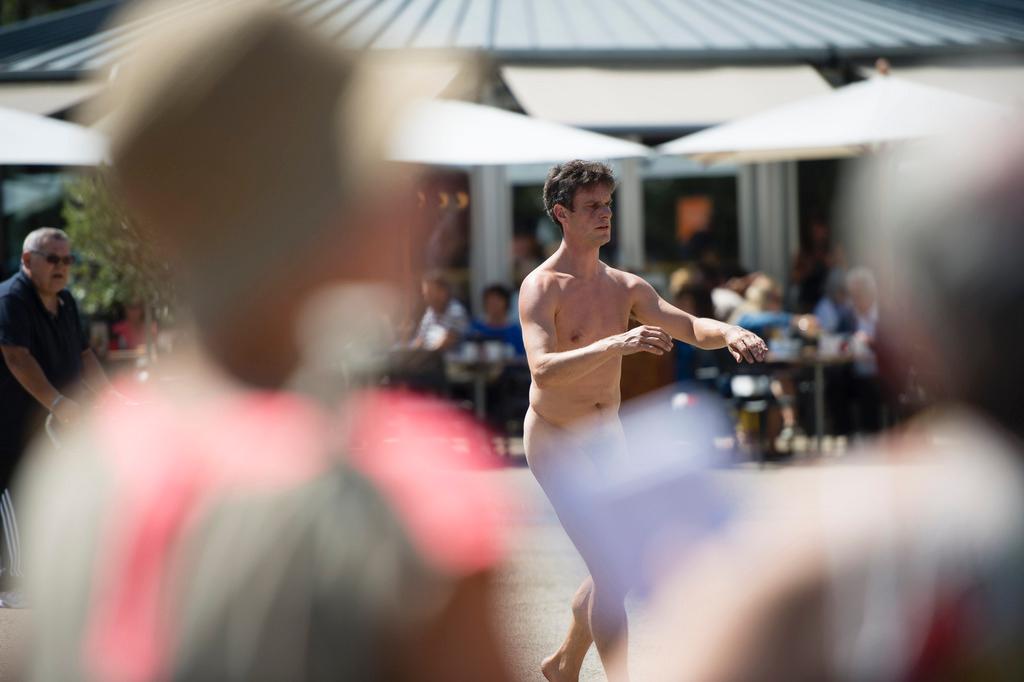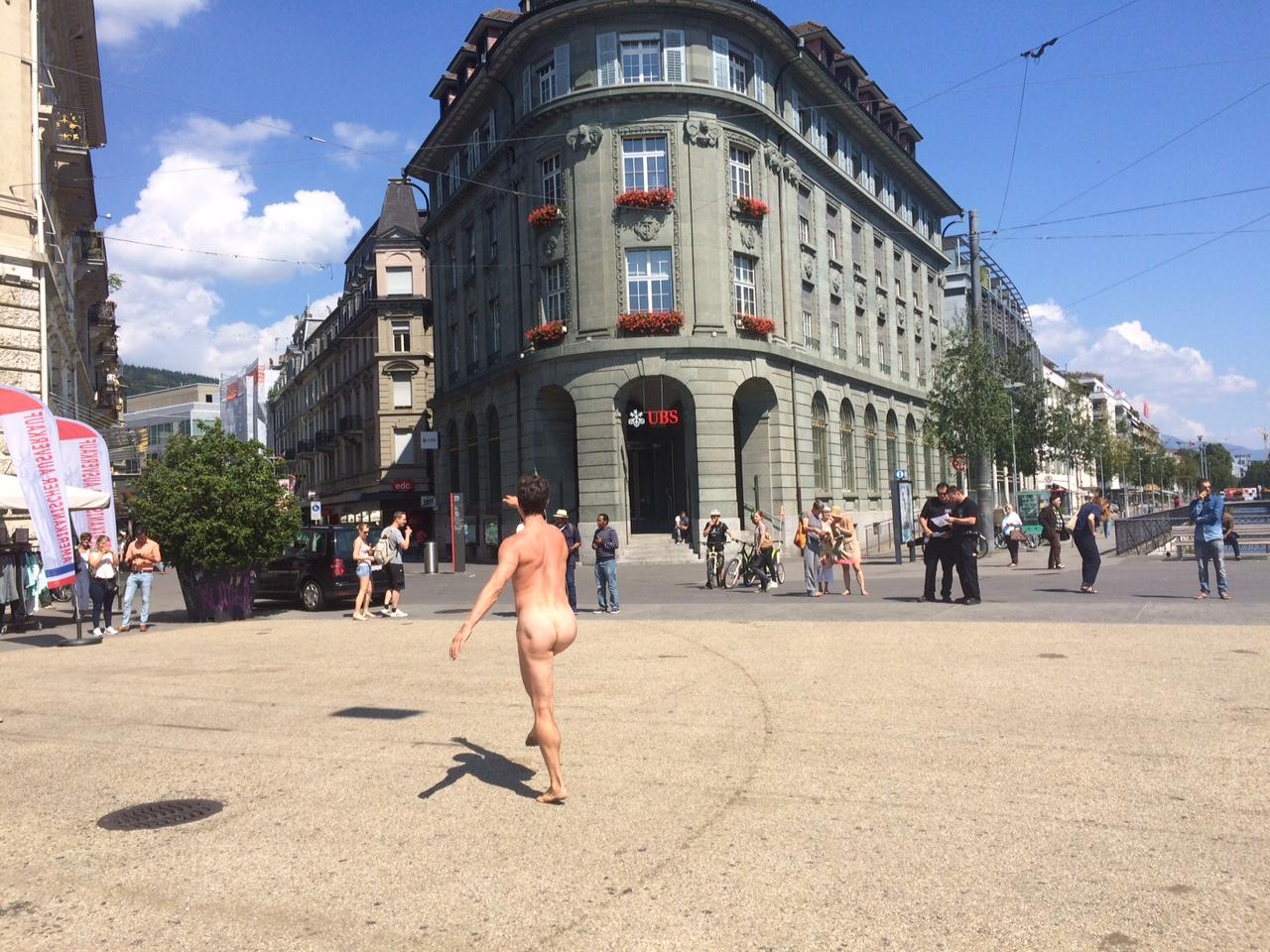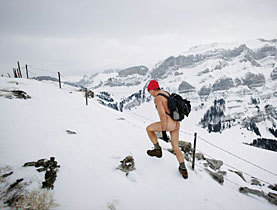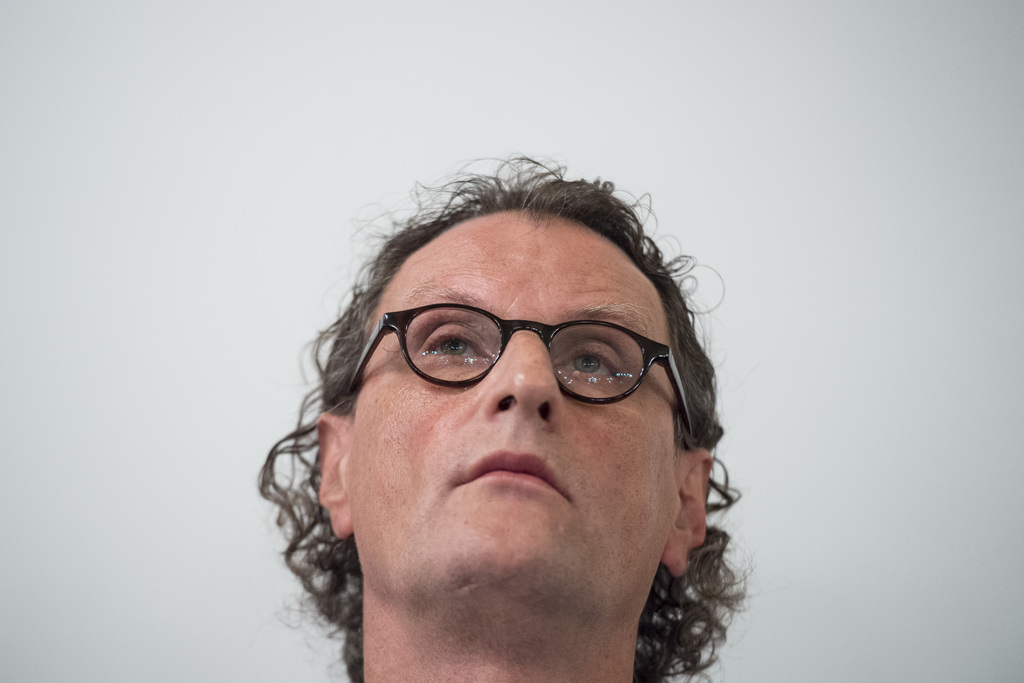Swiss embrace public nudity for art’s sake

Walking through the Swiss city of Biel on a sunny afternoon, everything is as normal. A crowd has gathered around a street performer - except - this performer doesn't have any clothes on. And he’s not alone: for two days the city is staging the world's first urban naked art festival.
“I think it’s funny!” laughs a woman in her 80s, standing by watching nude dancer, Foofwa d’Imobilité, as he moves fluidly around a large paved square. “But is he allowed to do that?”
He is. The bilingual city of Biel/Bienne has supported the Body and Freedom FestivalExternal link with CHF10,000 ($10,500 ) and the city’s head of cultureExternal link, Cédric Némitz, told swissinfo.ch there is no law against being naked in a public place in the canton of Bern.
“In Biel we have a fund for cultural events – all different kinds of cultural events. It has to be professional and meet certain criteria of course,” Némitz said. “There was only ever one question – is this allowed on the streets of Biel? The security department here said, ‘yes, that’s possible’ and so, we could allow it.”
Six years ago a much smaller naked performance took place in Biel.
“I organised around 16 people to stand naked in a central square of the city. Biel was open to experiment,” Swiss artist Thomas Zollinger, who organised the events told swissinfo.ch.
However, pressure from authorities in surrounding towns who weren’t happy with the naked bodies on display, meant Biel took some convincing to allow Zollinger to stage another event. When he finally set up a naked performance in 2014 – “an art walk with nude accents” – he was fined for straying outside of the space he was authorised to use.
The city’s main concern, according to Zollinger, was that the performers had to stay away from the roads, as there was a danger that car drivers could be distracted.
Watching Foofwa d’Imobilité (he changed his name from his birth name), this seems a valid concern. People stop in their tracks, whether on the pavement or in the middle of crossing the road by his performance space, and stare, stunned at what is unfolding before their eyes.
“What is he doing?” a passerby asks her friend. “Is he drunk?”

More
Nude art festival
A tale of no clothes
The Swiss have a mixed relationship with public nakedness. Nude saunas or group showers at sports centres are a constant topic of discussion between the Swiss – ambivalent, accepting – and visitors or new residents to Switzerland from more body-private cultures, who often react with suspicion or embarrassment.
On a much more high profile level however, naked hiking has formed the focal point of public discussion and media attention, on where people should be allowed to take their clothes off outside their own home.
In October 2009 a naturist hiker was reported to the police after a woman spotted him near a picnic area in the canton of Appenzell Outer-Rhodes, in eastern Switzerland. He was fined, refused to pay and the case went to court in 2010. The keen rambler, who said he’d been hiking in the nude for two years and saw nothing wrong with it, was then acquitted.
The story didn’t end there however, the prosecution took it to the Swiss Federal Court in Lausanne, which ruled that cantons were allowed to impose penalties on those choosing to go hiking in the nude.
The canton Appenzell Inner-Rhodes, a traditional and Catholic canton, slapped a ban on nude hiking altogether in 2009 after a wave of nudists, some from neighbouring countries, took to their idyllic hiking trails to be completely at one with nature.
Provocative
The attitude towards public nudity, or serious infringements of public decency depending on your point of view, vary widely between the different parts of the country.
At the well-known art fair, Art Basel, in 2014, Swiss performance artist Milo Moiré attracted worldwide attention and some criticism, for an unofficial show outside the main event, involving dropping paint-filled eggs from her vagina. Attention-seeking or making a powerful statement?
Performing without clothes on is not new to the art world, but to have such a large number of performers over two days, in an urban setting, on the streets is highly unusual.
“There are some people who really don’t like the naked body – they are offended for reasons I don’t understand,” said Zollinger. “Nudity is not usual in Switzerland, but people are liberal and tolerant, more so than twenty, thirty years ago I would say. People want freedom, freedom of behaviour.”
The performances at the Body and Freedom festival range from a person lying under covers in a bed, to a woman simply walking and standing with no clothes on in the street, to a group of around ten dancers who began completely clothed, then peeled off the layers as they rolled around the floor in a mass pile of squirming bodies.
Nudity – a choice
Foofwa d’Imobilité, a dancer from Geneva who performed early on in the festival, stood watching a man and a woman intertwine themselves with a tree outside a supermarket. Now fully clothed he commented, “this makes me want to take my clothes off and join in!”
He took part in Zollinger’s previous ‘art walk’, and says dancing naked “is a choice – part of a larger palette”. He hasn’t danced naked in such a setting before. “It’s really interesting to have this confrontation with reality, nature and with accidental spectators”.
The bottom line for many of those watching is why the performances have to be nude. “Naked you can see more, you can have more – there are more choices,” muses the dancer. “On top of this there is this simple thing of a body being just as it is.”
For Zollinger the answer is a concept he has being moving towards for a number of years. “I asked myself what I could eliminate [from my performances]. So I removed the clothes to really have the raw body…there is a state of Zen behind this. You stop thinking, you are pure”.

In compliance with the JTI standards
More: SWI swissinfo.ch certified by the Journalism Trust Initiative



You can find an overview of ongoing debates with our journalists here. Please join us!
If you want to start a conversation about a topic raised in this article or want to report factual errors, email us at english@swissinfo.ch.